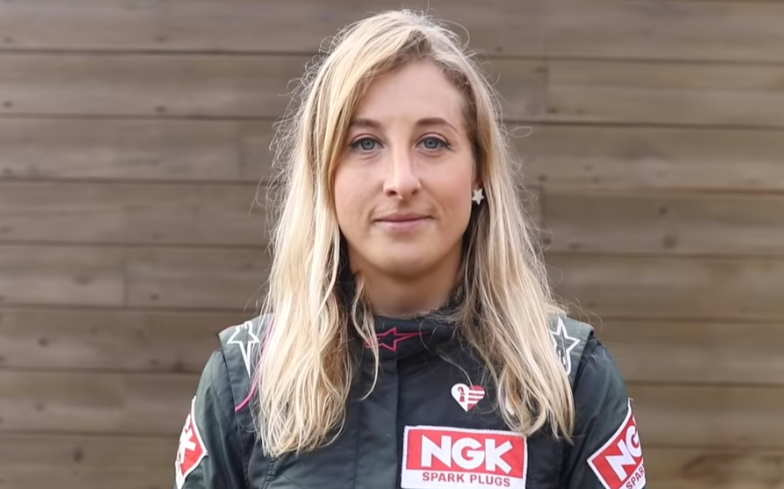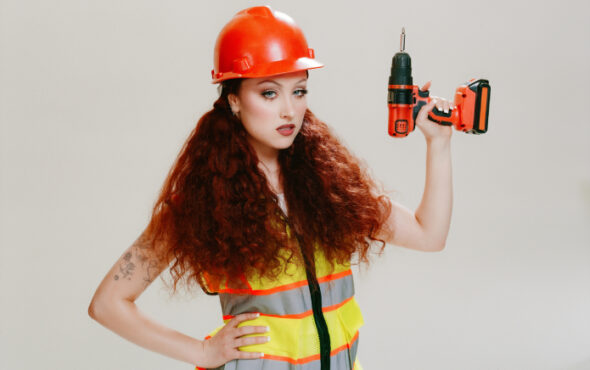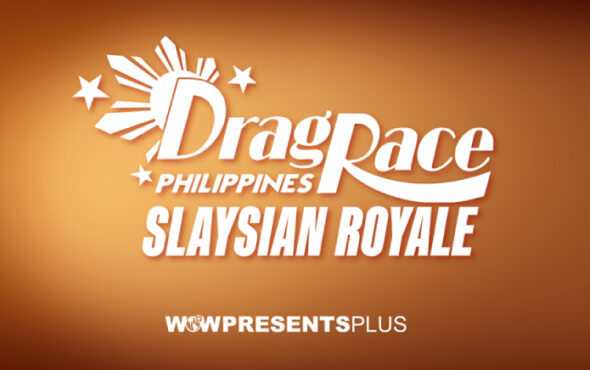
“I think so much starts with visibility, when you can’t see anyone like you in the career or sport you want to be part of, it creates a barrier for participation and engagement.”
We caught up with trans racing driver Charlie Martin as she continues to prepare to make history by becoming the first trans driver to race the 24 hours of Le Mans. Charlie has also been an important trailblazer for LGBTQ visibility in motorsport, being both a sport ambassador for Stonewall and helping launch Racing Pride UK, which aims to increase LGBTQ visibility within motorsport.
Among some of the races she’s competed in, she and a team finished fourth in the Michelin Le Mans Cup and second in a Race of Remembrance at the European Hillclimb.
As her career continues to ascend, Charlie told us about how accepting motorsport has been of her trans identity, trans women competing in sport, how sport can become more accepting of the LGBTQ community, and the role the media should play when an athlete does come out.
On the whole, how welcoming has British motorsport been of your gender identity?
I was worried about coming out, but thankfully the response has been positive. Inevitably I’ve had some backlash on social media which I was prepared for (I never read negative comments), but these people have been in a minority, the sport and motorsport media as a whole have been accepting and welcoming. It can be hard when you’re the first person to do something like this, I just want everyone to see and feel that they have a place in the sport, regardless of how they were born.
How do you think embracing your gender identity helped to shape your career?
Transition was the scariest thing, so you can imagine that after climbing my own personal mountain, anything felt possible. The confidence and self-belief that followed meant that I started pushing myself further and harder in my career, like going off to race in France for 3 years – I made so many friends over there and I now speak fluent French. This all helped empower me to come back to the UK last year and come out on International Trans Day of Visibility, it’s unlocked my true potential as an athlete and driver. I’d almost certainly never have taken the risks I needed to take too.
Where do you think your career will take you?
Aside from becoming the first trans driver to race at the 24 hours of Le Mans, I’d like to help make motorsport more inclusive, I guess like what Sir Jackie Stewart did for safety in Formula One back in the 60’s when people were regularly losing their lives in accidents. I’m keen to start working in television as a presenter too, I’ve loved everything I’ve done on TV from Ninja Warrior to Good Morning Britain, so it seems like a natural direction to progress my career in.
There doesn’t seem to be a lot of LGBTQ representation in motorsport, what do you think can be done to make it a more appealing place for LGBTQ people?
This summer I helped launch Racing Pride, the first ever movement of its kind focused on creating positive awareness for the LGBTQ community in motorsport, we’re hoping it will become a registered charity very soon. I think so much starts with visibility, when you can’t see anyone like you in the career or sport you want to be part of, it creates a barrier for participation and engagement. A big part of how we achieve this is undoubtedly through working with brands and partners who believe in the core message we’re promoting, and also through the support of championship organisers and governing bodies like the FIA & Motorsport UK.
Motorsport is also dominated by males, what can be done to change this? And do you think women will be able to reach the highest levels of the sport?
You have to view the sport as a pyramid, we need more girls joining at the bottom, because the further up you go the fewer people there are (at pro level). So if there are only 10% of women to start with it’s a simple question of maths – you will struggle to find women filling the top spots. I have no doubt that women can and will reach the highest echelons of motorsport, we’ve already demonstrated this with drivers like Michele Mouton back in the 80’s driving in Group, and just look at Jamie Chadwick. Women have everything it takes to make it from within, it’s the external support that’s needed from brands who don’t see backing a woman in motorsport as a risk.
With the success of the US women’s football team, that features many LGBTQ players, how much hope do you have that more LGBTQ athletes will come out?
Right now I’m very hopeful, the coverage of the Women’s World Cup was on a whole new level with big brands like Budweiser backing the England team, events like that are bound to have a positive impact. LGBTQ people are obviously prevalent throughout society, so why should sport be any different? I spoke at the Stonewall summit last September and all the UK’s major governing bodies like the FA, RFU and Sport England were there talking about the steps they’re taking to make their sports more inclusive – it made me feel very positive.
What do you think can be done to help more current LGBTQ closeted athletes come out?
Obviously the media has a big responsibility, it was sad seeing the situation unfold this summer when a premiership footballer was (supposedly) about to come out, only to change their mind at the last moment due to the impending media frenzy… athletes have to deal with huge amounts of pressure as it is, and coming out is a daunting moment in anyone’s life, so the press really need to be respectful and think about the types of stories & headlines they publish.
We’ve seen athletes like Gus Kenworthy and Tom Daley publicly calling on closeted athletes to come out, do you think this is the right move?
I think the more people come out, the less of a big deal it will be in future, so at this point in time we do need people who are willing to be visible to help create change in sport and society. Motorsport has so little visible diversity that I personally felt a sense of duty to be out, because I know how much difference it can make in helping other people. For the record, I know several people who’ve come out in motorsport in the last 18 months who messaged me saying they would never have had the courage to do so had they not seen the positive reaction I’d had.
We’ve seen a backlash against trans women competing in sports in recent months. For instance, under current ECB rules, trans people can play in the men’s or women’s domestic cricket teams based on their self-identified gender. They are now reviewing this policy however, to bring domestic games in line with international rules. What is your take on this?
From what I know about elite/professional level, most sports seem to be following the IOC’s guidelines for trans women. I think there is still a lot of research that needs to be done as it will make things clearer and help inform the discussion. Each sport has its own nuances too, so it’s not always easy to apply a one size fits all rule, but we also have to remember that sport by its very nature is not always ‘fair’. How many athletes have physical advantages that benefit them, or are born in climates that condition them to perform more efficiently? Fundamentally we need to remember that sport should be for everyone, and we must never lose sight of that fact.
With last year’s Pride in London being hijacked by anti-trans activists, what did it mean to you to see how much support the trans community was given in this year’s march?
It was heartwarming to see the support this year, especially when you have Little Mix marching with Mermaids, it sends out a very positive message to young trans kids. It’s so frustrating to have this vocal minority spouting hatred at an event like Pride, I mean trans people have a hard enough time just trying to be our true selves. I think the huge support this year was a genuine pushback and a show of strength just when it was needed, love always wins though over hate.
With the anti-trans rhetoric that dominates media coverage, what can be done to counter that?
We need the media to focus on positive stories for one. Yes there are some awful things happening out there (hate crimes and waiting times for gender identity clinic appointments are two to three years) that need to be reported on, but we need to hear about all the trans people out there who are doing incredible things – and stop painting the trans community as being one dimensional. Being trans is not the single thing that defines me, so why are trans people so frequently represented in a way that panders to that view? The amount of times I’ve done interviews where journalists start asking me about what surgery I’ve had and when I first took hormones… when I just want to talk about racing or anything else to be honest.
What are your plans for the rest of 2019, both on and off the track?
Well I’m in the process of moving home, so that’s taking up a lot of time right now, I’m really excited about moving to a new city though. A downside is that I’ve not had a break since surfing in Bali at Christmas, so I’m desperately in need of some time out, which is looking like Christmas as there’s a lot on right now. I’m working out plans for racing next year, my ambition is to race in the 24 hours of Le Mans (and make history as the first trans driver to do so) and this is a multi year project so I’m always working hard to make that happen. I’m looking forward to getting back on track soon before the season ends, I’m off to the Nürburgring this weekend so you never quite know what’s round the corner!
You can follow Charlie on Twitter and Instagram, and learn more about Racing Pride UK here.



